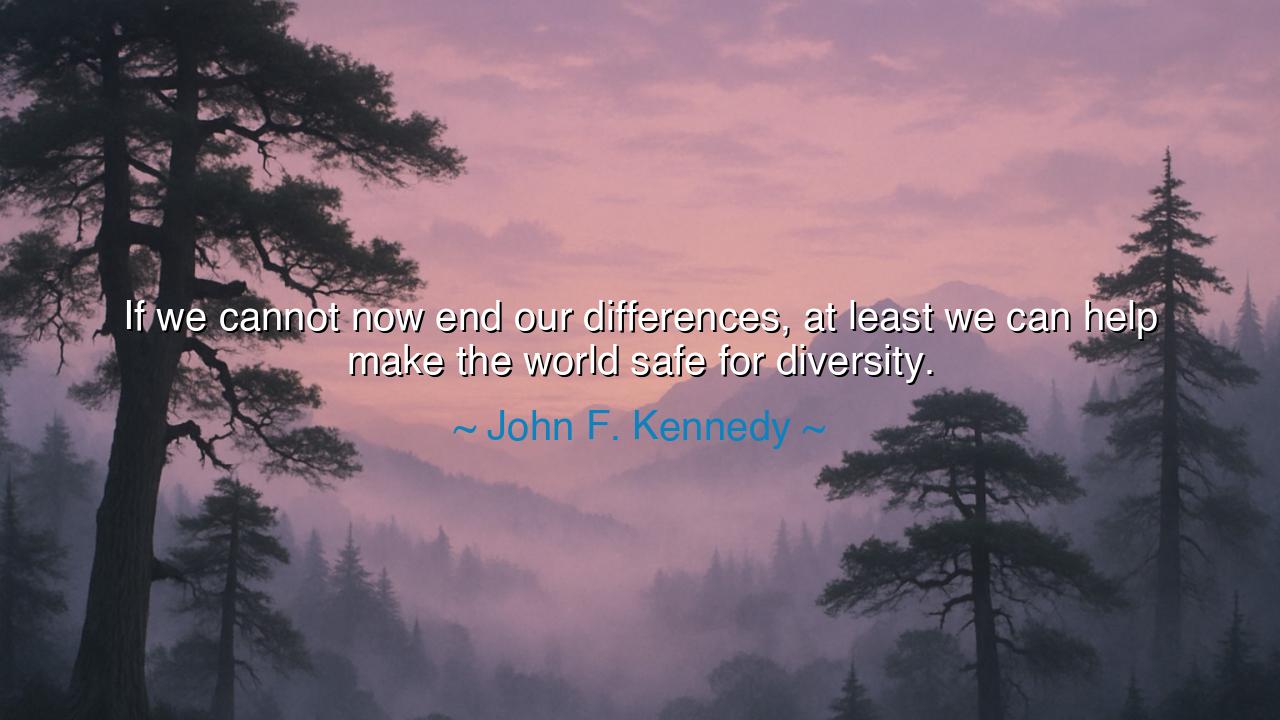
If we cannot now end our differences, at least we can help make
If we cannot now end our differences, at least we can help make the world safe for diversity.






The words of John F. Kennedy—“If we cannot now end our differences, at least we can help make the world safe for diversity.”—stand as a testament to the eternal struggle between conflict and coexistence. Spoken amid the cold shadows of the twentieth century, they remain a beacon for all who strive to balance strength with compassion, conviction with tolerance. Kennedy’s voice, shaped by the storms of the Cold War, rose not only as the leader of a nation but as the conscience of a world teetering between destruction and hope. His words remind us that while the dream of perfect unity may elude humanity, peaceful diversity—the acceptance of difference without violence—remains within our grasp.
The origin of this quote lies in Kennedy’s address before the United Nations in 1963, a moment when the world was still trembling from the Cuban Missile Crisis. The threat of annihilation hung heavy in the air; nuclear fire could be unleashed at the whim of pride or fear. Yet Kennedy, instead of calling for domination or victory, spoke of restraint, cooperation, and respect for difference. His vision was revolutionary not in its ambition, but in its humility. He knew that mankind was too vast, too varied, to ever think alike. Thus, he called not for the end of difference, but for its protection—an understanding that civilization’s strength lies not in sameness, but in the peaceful coexistence of many truths.
To make the world safe for diversity, Kennedy appealed to a principle older than any nation—the sacred law of coexistence. For as long as humankind has walked the earth, the struggle has been between those who seek to build bridges across difference and those who seek to erase it. Empires have fallen for trying to impose uniformity, and societies have flourished when they honored the variety of the human spirit. From ancient Athens, where free thought birthed philosophy, to medieval Cordoba, where Muslim, Christian, and Jew studied side by side, history whispers the same truth: that diversity is not weakness but wealth, a divine mosaic where every color gives meaning to the whole.
Yet Kennedy’s wisdom was not born of idealism alone—it was forged in the fire of realism. He understood that humanity’s divisions run deep: religion against religion, race against race, ideology against ideology. To expect their immediate end was folly. But to accept their inevitability without striving for peace was suicide. Thus, his challenge to the world was not to erase difference, but to contain its dangers through understanding. “If we cannot end our differences,” he said, “let us at least not destroy ourselves because of them.” In those words lies the humility of a true leader—one who seeks harmony, not conquest.
Consider, for example, the story of Nelson Mandela, who would embody Kennedy’s dream decades later. After twenty-seven years of imprisonment, Mandela emerged not with vengeance, but with vision. In a nation divided by color and hate, he chose reconciliation over retribution. He knew he could not end the differences between Black and white, between oppressor and oppressed, overnight. But he made his land safe for diversity, planting the seeds of a unity built on forgiveness rather than force. His leadership, like Kennedy’s vision, proved that greatness lies not in silencing difference, but in allowing it to live without fear.
In truth, diversity is the heartbeat of creation itself. The stars differ in light, the trees in shape, the people in tongue, and yet the universe thrives in that difference. It is only when pride and fear twist diversity into division that suffering begins. Kennedy’s words are thus not only political—they are spiritual. They call us to rise above the tribal instinct that divides “us” from “them,” and to recognize that the world’s beauty is woven from its contrasts. To make the world safe for diversity is to make it safe for humanity itself.
The lesson of Kennedy’s quote is both timeless and urgent. We cannot always agree—but we can always respect. We cannot always unite in opinion—but we can unite in purpose. Each of us, in our small circle of life, has the power to protect diversity: by listening where others shout, by understanding where others judge, by standing beside those who are different rather than apart from them. If nations are to survive, so too must the spirit of empathy within each individual. For peace begins not in treaties or speeches, but in the hearts of ordinary men and women who choose tolerance over hatred.
And so, my child, remember these words: diversity is not a threat to be feared, but a treasure to be guarded. When you meet one who is unlike yourself, do not see an enemy, but a reflection of the vastness of life. The world will never be one voice—but it can be one choir, singing in harmony though in different tones. If we cannot end our differences, let us, like Kennedy, make them safe. For in that safety lies the future of humankind—the dream of a world where every soul may stand unafraid in its own truth, and yet stand together in peace.






AAdministratorAdministrator
Welcome, honored guests. Please leave a comment, we will respond soon